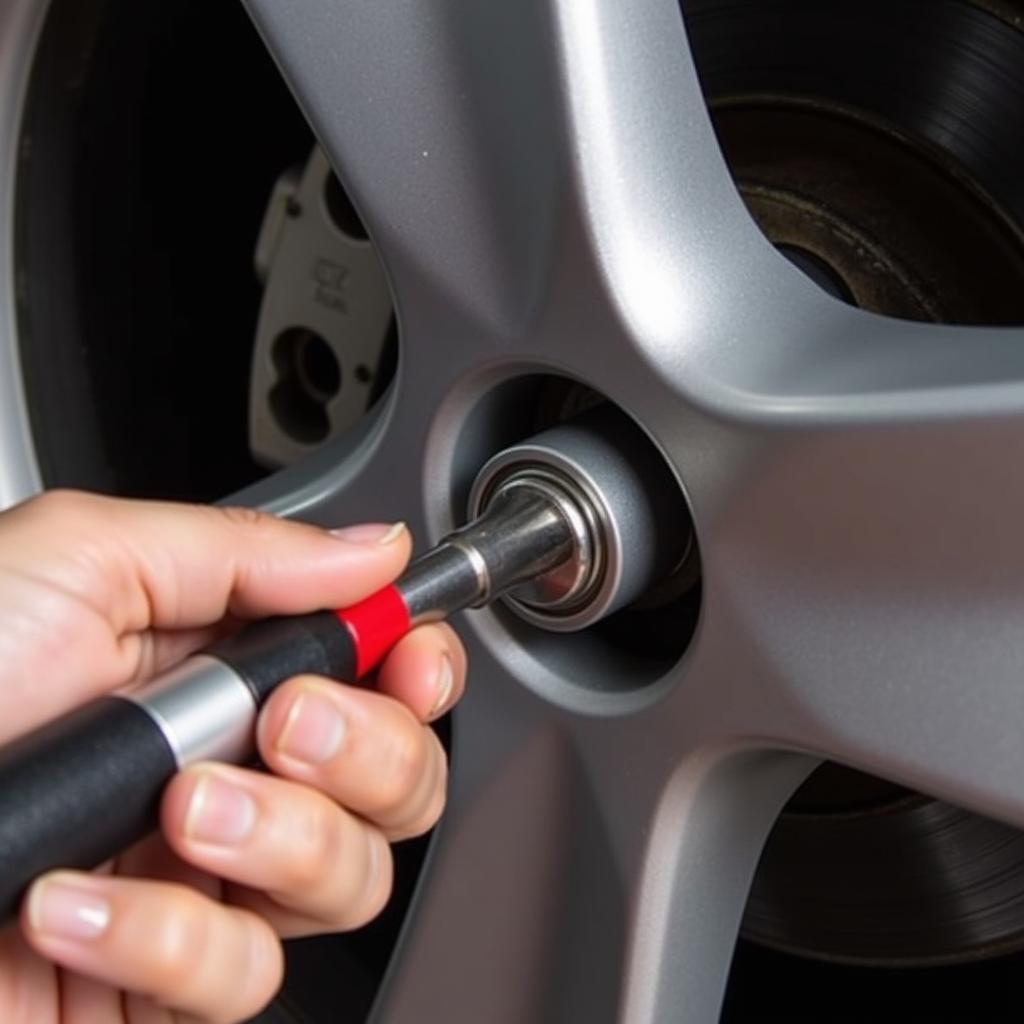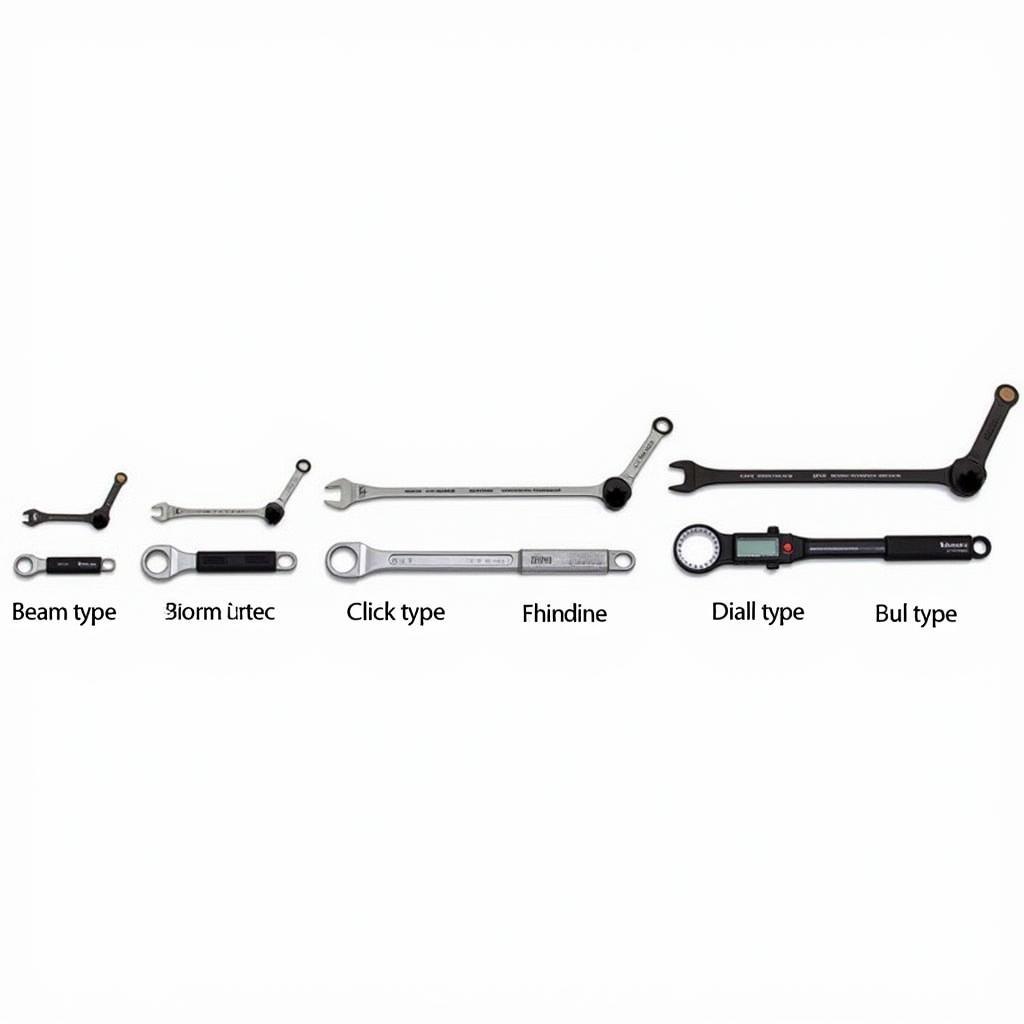Torque measuring tools are essential for any car enthusiast or professional mechanic. Whether you’re rebuilding an engine, changing a tire, or simply performing routine maintenance, using the correct torque specification ensures safety, performance, and longevity of your vehicle’s components. Understanding the different types of torque measuring tools and how to use them correctly is crucial for successful car repairs and modifications. We’ll explore the world of torque wrenches and other tools, helping you choose the right one for your needs.
Knowing the correct torque specifications is just as important as having the right tools. Over-tightening can lead to stripped threads, broken bolts, and warped components, while under-tightening can cause parts to loosen and potentially lead to dangerous situations. This guide will delve into the importance of torque specifications and how to find them for your specific car make and model. We’ll also discuss the practical applications of torque measuring tools in various car maintenance and repair scenarios.
Types of Torque Measuring Tools for Cars
Several types of torque measuring tools cater to different needs and budgets. Let’s explore the most common ones used in the automotive world:
-
Beam Type Torque Wrenches: These are the simplest and most affordable type. A deflecting beam indicates the torque applied. While they are less precise than other types, they are durable and reliable.
-
Click Type Torque Wrenches: These are the most popular type for general automotive use. They produce an audible click when the desired torque is reached. Click type torque wrenches offer good accuracy and are relatively easy to use.
-
Digital Torque Wrenches: These offer the highest level of precision and often include additional features like angle measurement. They are ideal for professional mechanics and serious DIYers.
-
Dial Type Torque Wrenches: These wrenches use a needle on a dial to indicate the applied torque. They are a good balance between accuracy and affordability.
After the introductory section, linking to resources about car engine building tools makes perfect sense. For those interested in delving deeper into engine building, our guide on car engine building tools provides a wealth of information on the specific tools needed for this complex task.
How to Use a Torque Measuring Tool Correctly
Using a torque wrench correctly is crucial for achieving accurate and consistent results. Here’s a step-by-step guide:
-
Select the correct socket or bit: Ensure it fits snugly onto the fastener.
-
Set the desired torque: Consult your vehicle’s repair manual for the correct specification.
-
Place the wrench on the fastener: Ensure it’s perpendicular to the fastener.
-
Apply smooth and steady pressure: Avoid jerky movements.
-
Stop when you hear the click (for click type) or reach the desired reading (for other types): Do not over-tighten.
 Demonstrating Proper Torque Wrench Usage on a Car Wheel Nut
Demonstrating Proper Torque Wrench Usage on a Car Wheel Nut
Understanding Torque Specifications
Torque specifications are crucial because they ensure that fasteners are tightened to the correct level of tightness. This prevents damage to components and ensures that parts are secured properly. You can typically find torque specifications in your vehicle’s repair manual or online databases.
Those working on vintage vehicles might find our resource on tools for working on a 1950s car particularly helpful, as it addresses the specific challenges and tools required for these classic automobiles.
Why are Torque Measuring Tools Important for Cars?
Torque measuring tools are essential for ensuring the safety and reliability of your vehicle. Correctly torqued fasteners prevent critical components from loosening or failing, which could lead to accidents or costly repairs.
 Various Torque Wrenches for Automotive Applications
Various Torque Wrenches for Automotive Applications
When Should I Use a Torque Measuring Tool?
Any time you’re working with fasteners on your car, you should consider using a torque measuring tool, especially for critical components like engine parts, suspension components, and wheel lugs. Even seemingly simple tasks like changing a tire require proper torque to ensure safety.
“Using a torque wrench is like adding the final, crucial ingredient to a recipe. Without it, the dish might not turn out as expected, and in the case of a car, that could have serious consequences,” says John Miller, a seasoned automotive engineer.
Calibrating Your Torque Wrench
Just like any precision tool, torque wrenches need to be calibrated periodically to maintain accuracy. This can be done by a professional calibration service or using a torque wrench calibrator.
“Regular calibration ensures that your torque wrench delivers accurate readings, preventing potential damage to your vehicle and ensuring your safety,” adds Maria Sanchez, a certified mechanic with over 20 years of experience.
Conclusion
Torque measuring tools are indispensable for any car owner or mechanic. Understanding the different types, knowing how to use them correctly, and adhering to the correct torque specifications are essential for ensuring the safety, performance, and longevity of your vehicle. Investing in a quality torque measuring tool and understanding its proper use is a worthwhile investment for any car enthusiast. If you’re looking to delve deeper into car diagnostics, our article on program cars diagnostics engine with a laptop and usb kkl provides a valuable starting point.
FAQ
- What is the most common type of torque wrench for car use? Click type torque wrenches are the most common due to their ease of use and good accuracy.
- Where can I find the correct torque specifications for my car? Your vehicle’s repair manual or online databases specific to your car’s make and model.
- How often should I calibrate my torque wrench? It’s recommended to calibrate your torque wrench annually or more frequently if it’s used heavily.
- What happens if I over-tighten a bolt? Over-tightening can strip threads, break bolts, or damage components.
- What happens if I under-tighten a bolt? Under-tightening can cause parts to loosen, potentially leading to dangerous situations.
- Can I use a regular wrench instead of a torque wrench? While possible, using a regular wrench doesn’t provide accurate torque control, increasing the risk of damage.
- Are digital torque wrenches worth the extra cost? Digital wrenches offer the highest precision and additional features, making them a good investment for professional mechanics and serious DIYers.
For further information about the manufacturing process of cars and the tools involved, you can explore our article on tools used to make cars.
Need Help? Contact us via WhatsApp: +1(641)206-8880, Email: [email protected] or visit us at 910 Cedar Lane, Chicago, IL 60605, USA. Our customer service team is available 24/7.

Leave a Reply